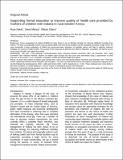Supporting formal education to improve quality of health care provided by mothers of children with malaria in rural western Kenya
Publication Date
2009-08-30Author
Rose Kakai, Diana Menya, Wilson Odero
Metadata
Show full item recordAbstract/
Home management of malaria (HMM) has been shown to be an effective strategy for reducing childhood mortality from malaria. The direct and especially indirect costs of seeking health care from formal facilities may be substantial, providing a major barrier for many households. Further evaluations of HMM and community-based utilization of available options will help to optimize treatment strategies and maximize health benefits. The purpose of this study was to determine the effect of education, occupation, and family income on the choice of health care options for malaria. Methodology: This was a cross-sectional, community-based study conducted between November 2007 and December 2007, using quantitative data collection methods. Mothers of children aged younger than five years were interviewed using a questionnaire to elicit responses on the mothers’ level of education, occupation, income and malaria health care options. Results: A total of 240 mothers of children aged younger than 5 years were interviewed between November and December, 2007. There was a direct relationship between formal education and occupation. The mean monthly family income was highest among those employed (KSh. 14,421) followed by businesswomen (KSh. 3,106) and farmers (KSh. 1,827) respectively (p<0.01). Those employed were more likely to take their ill children to a health facility (p = 0.05) or choose an antimalarial drug for home treatment. Conclusion: Supporting formal education may scale up the income of family health care providers and improve the quality of HMM among children living in rural communities.

